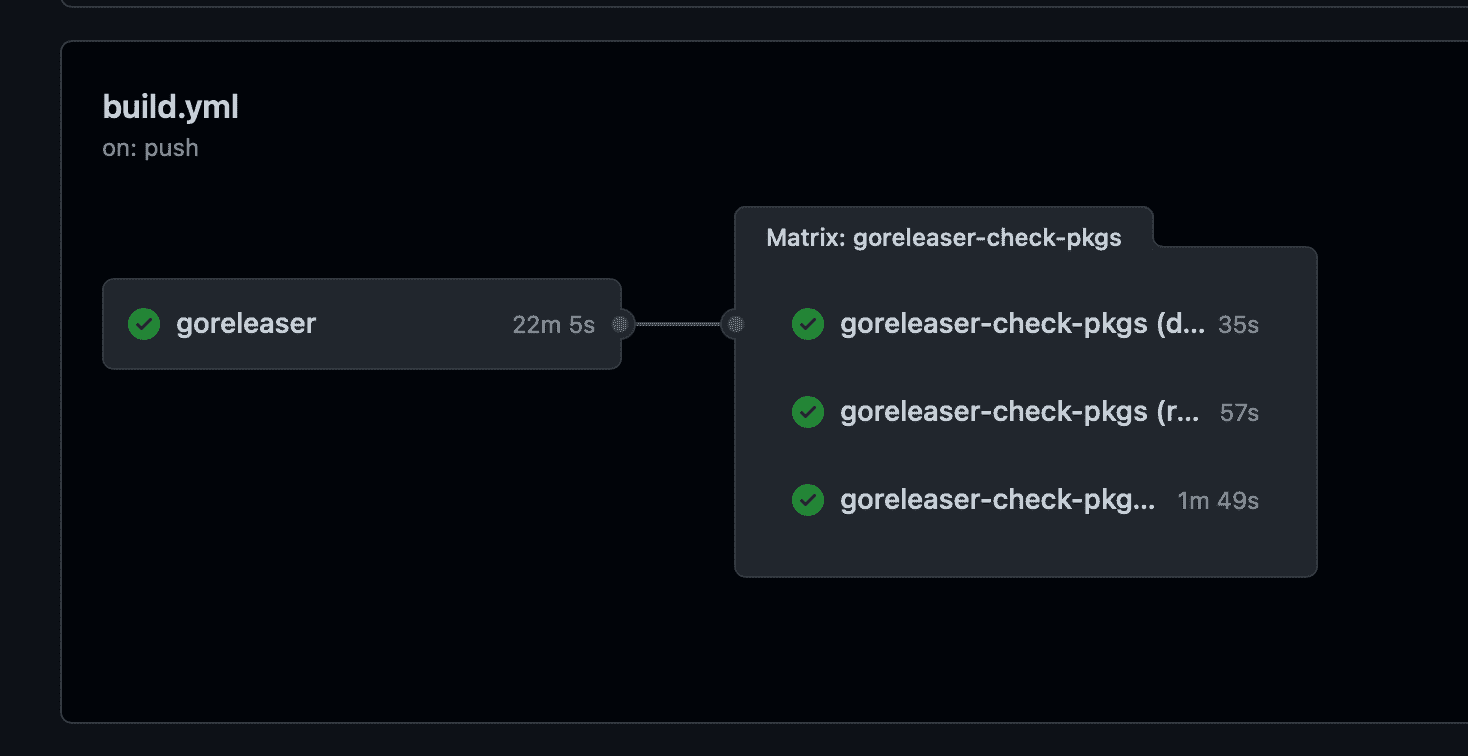Announcing GoReleaser v2.1
Winter is here (in the South America)! Let’s see whats new! Highlights new: before …
One issue we had from time to time on GoReleaser was related to its Linux packages.
We had a single map from GOARCH to Linux arch, when in fact, each package manager might have their own.
That led to less popular packages (e.g. arm) to report the wrong architecture and thus be not installable.
This was recently moved to nFPM, and we now just pass a concatenation of GOARCH+GOARM+GOMIPS, and each packager handles it on nFPM.
With that change, we added tests for more arches on nFPM, and also added tests to GoReleaser packages themselves.
The idea consists in 2 steps:
This was easily done using GitHub Actions Cache:
- uses: actions/cache@v2
with:
path: |
./dist/*.deb
./dist/*.rpm
./dist/*.apk
key: ${{ runner.os }}-go-${{ hashFiles('**/*.go') }}-${{ hashFiles('**/go.sum') }}
This will cache all deb, rpm and apk files on dist after the release.
Here we used the matrix feature of GitHub actions, as well as Docker, to install the package on different platforms:
jobs:
goreleaser-check-pkgs:
runs-on: ubuntu-latest
env:
DOCKER_CLI_EXPERIMENTAL: "enabled"
needs:
- goreleaser
if: github.ref == 'refs/heads/main'
strategy:
matrix:
format: [ deb, rpm, apk ]
steps:
- uses: actions/checkout@v2
with:
fetch-depth: 0
- uses: arduino/setup-task@v1
with:
version: 3.x
repo-token: ${{ secrets.GITHUB_TOKEN }}
- uses: docker/setup-qemu-action@v1
- uses: actions/cache@v2
with:
path: |
./dist/*.deb
./dist/*.rpm
./dist/*.apk
key: ${{ runner.os }}-go-${{ hashFiles('**/*.go') }}-${{ hashFiles('**/go.sum') }}
- run: task goreleaser:test:${{ matrix.format }}
Notice that it needs the goreleaser job, and only runs on main.
After setting up things we need (docker, task, qemu), we run a task named goreleaser:test:${{ matrix.format }}.
Let’s take a look on how that looks like.
Putting simply, each task spawns a Docker container for several platforms, install the package and checks if goreleaser --version succeeds.
If something fails, it will exit 1, so we’ll know something is wrong.
goreleaser:test:pkg:
desc: Test a package
cmds:
- docker run --platform linux/{{.Platform}} --rm --workdir /tmp -v $PWD/dist:/tmp {{.Image}} sh -c '{{.Cmd}} && goreleaser --version'
goreleaser:test:rpm:
desc: Tests rpm packages
vars:
rpm: 'rpm --nodeps -ivh'
cmds:
- task: goreleaser:test:pkg
vars:
Platform: '386'
Image: centos:centos7
Cmd: '{{.rpm}} goreleaser-*.i386.rpm'
- task: goreleaser:test:pkg
vars:
Platform: 'amd64'
Image: fedora
Cmd: '{{.rpm}} goreleaser-*.x86_64.rpm'
- task: goreleaser:test:pkg
vars:
Platform: 'arm64'
Image: fedora
Cmd: '{{.rpm}} goreleaser-*.aarch64.rpm'
- task: goreleaser:test:pkg
vars:
Platform: 'arm/6'
Image: fedora
Cmd: '{{.rpm}} goreleaser-*.armv6hl.rpm'
- task: goreleaser:test:pkg
vars:
Platform: 'arm/7'
Image: fedora
Cmd: '{{.rpm}} goreleaser-*.armv7hl.rpm'
goreleaser:test:deb:
desc: Tests rpm packages
vars:
dpkg: 'dpkg --ignore-depends=git -i'
cmds:
- task: goreleaser:test:pkg
vars:
Platform: 'amd64'
Image: ubuntu
Cmd: '{{.dpkg}} goreleaser*_amd64.deb'
- task: goreleaser:test:pkg
vars:
Platform: 'arm64'
Image: ubuntu
Cmd: '{{.dpkg}} goreleaser*_arm64.deb'
- task: goreleaser:test:pkg
vars:
Platform: 'arm/6'
Image: debian
Cmd: '{{.dpkg}} goreleaser*_armel.deb'
- task: goreleaser:test:pkg
vars:
Platform: 'arm/7'
Image: ubuntu
Cmd: '{{.dpkg}} goreleaser*_armhf.deb'
goreleaser:test:apk:
desc: Tests rpm packages
vars:
apk: 'apk add --allow-untrusted -U'
cmds:
- task: goreleaser:test:pkg
vars:
Platform: '386'
Image: alpine
Cmd: '{{.apk}} goreleaser*_x86.apk'
- task: goreleaser:test:pkg
vars:
Platform: 'amd64'
Image: alpine
Cmd: '{{.apk}} goreleaser*_x86_64.apk'
- task: goreleaser:test:pkg
vars:
Platform: 'arm64'
Image: alpine
Cmd: '{{.apk}} goreleaser*_aarch64.apk'
- task: goreleaser:test:pkg
vars:
Platform: 'arm/6'
Image: alpine
Cmd: '{{.apk}} goreleaser*_armhf.apk'
- task: goreleaser:test:pkg
vars:
Platform: 'arm/7'
Image: alpine
Cmd: '{{.apk}} goreleaser*_armv7.apk'
Note that different formats tests against different platforms.

How it looks like on GitHub Actions
That’s mostly because not all Linux distributions have all platforms available on Docker Hub - e.g. no Ubuntu 386.
Still, testing against those should cover most of the use cases, and I think other projects that worry about this might benefit for something like this themselves.